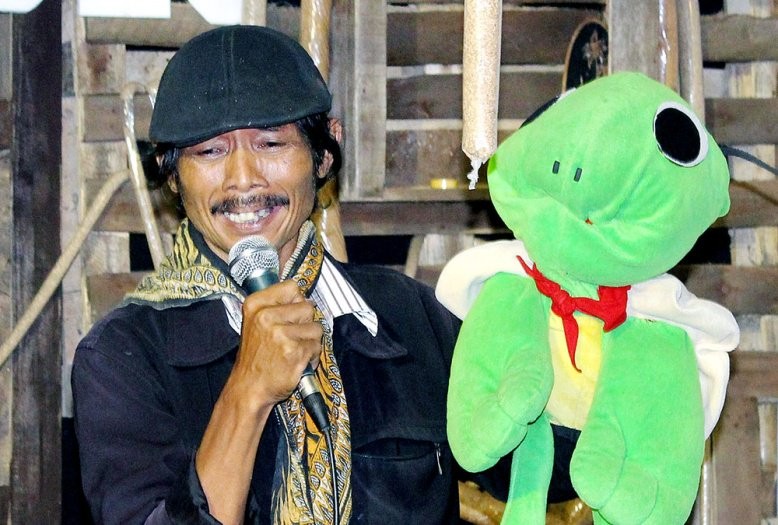Popular Reads
Top Results
Can't find what you're looking for?
View all search resultsPopular Reads
Top Results
Can't find what you're looking for?
View all search resultsTurtle time to open young minds
Multitalented artist and educator Johannes Aziz Suprianto aims high — not to clip the wings of riverbank children where their adult role models are largely day workers and snack sellers.
Change text size
Gift Premium Articles
to Anyone
If the name Johannes Aziz Suprianto doesn’t ring any bells, try Aziz Franklin.
Franklin is a name of distinction — two United States presidents were so labelled, Pierce and Roosevelt after the last name of founding father Benjamin; and also a school-going turtle who “could count by twos and tie his shoes,” the star turn in a series of Canadian children’s books and a TV series.
“I’ve long liked turtles because they’re independent, inquisitive and always go forward and carry their home,” Aziz said.
“So I’ve made a puppet to tell about the importance of developing a sense of curiosity about the world. That’s Franklin; on the stage he talks to me and I respond because I’m also Franklin.”
The Malang-based teacher and entertainer is a master of the sapeh or sape, a traditional lute from Kalimantan, which he finds more satisfying than the guitar he played until three years ago.
Along with green Franklin, the unusual flat-bed sapeh captures kids’ attention as the two Franklins subtly urge them to do well, stay the distance and beat down the barriers.
“What will you do when you grow up?” he asks around 50 elementary school children at a home-grown kampong arts festival while parents look on.
As the youngsters are scratching for answers, Franklin throws in suggestions: “Who’s going to be a doctor? Or a scientist? Hands up those who’ll be teachers. And who’ll be a pilot?”
The idea is to aim high and not clip the wings of the riverbank children where their adult role models are largely day workers and snack sellers. Franklin reminds them to open books. In this community some of the far-sighted leaders have set up a small library and reading room.
But without the money for private colleges they’ll still have to rise above the schooling on hand. Independent research shows that although attendance is up, quality is not.
Every three years, Indonesia participates in the OECD Program for International Student Assessment (PISA). The latest report tested 540,000 students from 72 countries. Although there have been some improvements, particularly among girls, Indonesia ranks 62, far behind most of its neighbors, including Vietnam.
Commenting on the findings in the online journal The Conversation, Dr Arnaldo Pellini of the Overseas Development Institute in London said inequality and school performance remains an issue in Indonesia: “The percentage of low performers in science among disadvantaged students is among the highest globally.”
Although Indonesia spends 20 percent of its budget on education it bumps along the bottom 10 nations in reading, science and maths. Singapore tops all; educationists say this is because it invests in teaching.
“We, the people, and not just the parents must work to improve schooling,” said Aziz, 51. “That means using every means possible and not just sticking to old techniques.
He recalled that in the Soeharto era, people knew little about world events because information was tightly controlled. In his case, he had to work it out himself, seeking secret sellers of illegally printed or second-hand books by overseas and local authors. “I found writers like Pramoedya Ananta Toer and Muchtar Lubis who were banned,” he said.
Among the books he scavenged were fairy tales of 19th century Danish writer Hans Christian Andersen. He found European yarns also had a place in Indonesia alongside the indigenous fables told by his grandmother to help him sleep “and inspired me to become a storyteller — though my talents come from God.” He is Catholic.
After training as a teacher, Aziz joined the Teater Keliling (Wandering Theater) troupe that was founded in 1974 by director Rudolf Puspa to take drama to ordinary people beyond Jakarta.
Performances were licensed and restricted, and scripts checked. Apart from local works by authors like the late dissenting poet and dramatist Rendra, they also staged the anti-establishment theater of Romanian-French playwright Eugene Ionesco.
He said at that time, they were constantly followed by intelligence agents and questioned about their work. “We always had to be careful. It was a frightening, exciting and challenging time, learning parts in buses and trains, a new town every night or so, not knowing how the authorities would react.”
The group toured several countries, including Pakistan, Thailand, Malaysia, Germany and France.
“Now we have freedom. The problems today are fake news and getting youngsters to realize their potential.”
From this mix plus embellishments has come Franklin’s present repertoire. His skills, drawn from working with the other knockabout creatives in Teater Keliling include ventriloquism, magic, singing — even hypnotism.
“I want to help open their minds […] There are many creatives in Malang, but if you want to be famous you have to go elsewhere,” he said.
“Now anything is possible. But each individual has to make the effort themselves. That’s Franklin’s message — strive to be the best.”
The big green turtle then smiles and nods vigorously. The kids laugh and clap. Their spirits have been lifted, and perhaps their futures.











